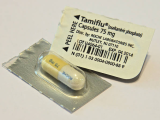May 24, 2013
US flu continues to decline, but 7 pediatric deaths reported
US influenza activity continued to drop last week, but seven new pediatric flu deaths were reported, the Centers for Disease Control and Prevention (CDC) reported today. Of the 7 new deaths, 4 were caused by influenza B, 1 by an H3 strain, and 2 by an influenza A strain of unknown subtype. They bring the season total to 146 pediatric flu deaths. No state reported regional flu activity, down from one state the week before, and only one state—Massachusetts—reported local flu activity. Of 2,104 respiratory specimens tested, 68 (3.2%) were positive for influenza, down from 5.1% the week before. Of all US deaths last week, 6.7% were attributed to pneumonia and influenza, up from 6.4% the week before but below the epidemic threshold of 7.0%. The proportion of outpatient visits for flulike illness was 0.9%, a figure that hadn't changed but was well below the national baseline of 2.2%.
May 24 CDC update
FDA warns of injected steroids from Tennessee compounding center
In the latest development in an outbreak of fungal infections tied to steroid injections, the US Food and Drug Administration (FDA) today cautioned healthcare providers not to administer steroid injections compounded by Main Street Family Pharmacy, LLC, of Newbern, Tenn. "Out of an abundance of caution, the FDA recommends that health care providers not administer any products labeled as sterile from Main Street and quarantine them until further guidance is provided," the agency said in a news release. It said it is working closely with the CDC and Tennessee authorities to investigate reports of seven adverse events associated with methylprednisolone acetate injections from Main Street. "Clinical information about these patients is pending; at least one of these adverse events appears to involve fungus," the FDA said. As of May 6, a multistate fungal infection outbreak involving methylprednisolone acetate produced by New England Compounding Center in Massachusetts had sickened 741 people and killed 55.
May 24 FDA news release
May 7 CIDRAP News scan on the outbreak
Japan finds tick that carries SFTS virus
The tick that carries a disease called severe fever with thrombocytopenia syndrome (SFTS) has finally been found in Japan, which has had 15 cases with 8 deaths since last summer, according to a report today from Japan Daily Press (JDP). The tick was found on a woman in her 60s who was being treated at a national medical center in Iwakuni City in western Japan. She was hospitalized in early April with a high fever, difficult breathing, and intermittent loss of consciousness, the story said. After a 3-millimeter-long tick was found on her arm, the National Institute of Infectious Diseases confirmed that it carried the virus. Eight of the 15 SFTS cases reported in Japan have been fatal, the report said. Earlier this week, South Korean media reported the first confirmed SFTS cases in that country. Those reports said the pathogen, a member of the bunyavirus family, is carried by Haemaphysalis longicornis ticks. The virus was discovered in China in 2009.
May 24 JDP story
May 22 CIDRAP News item about Korean case
Officials report 2nd recent polio case in Pakistan's tribal region
A second child has contracted polio in the North Waziristan tribal region of Pakistan near the Afghan border after the Taliban banned vaccinations there nearly a year ago, according to an Agence France-Presse (AFP) story yesterday. The child, a 3-year-old boy, is the second to contract the debilitating disease this month, and officials expect a larger outbreak, the story said. "The problem is that it is just a tip of the iceberg," said World Health Organization polio coordinator Elias Durry. "This is what will happen if we have children without polio vaccination." North Waziristan tribesmen endorsed the Taliban ban and stopped authorities from vaccinating children in a nationwide campaign in June 2012.
May 23 AFP story




















